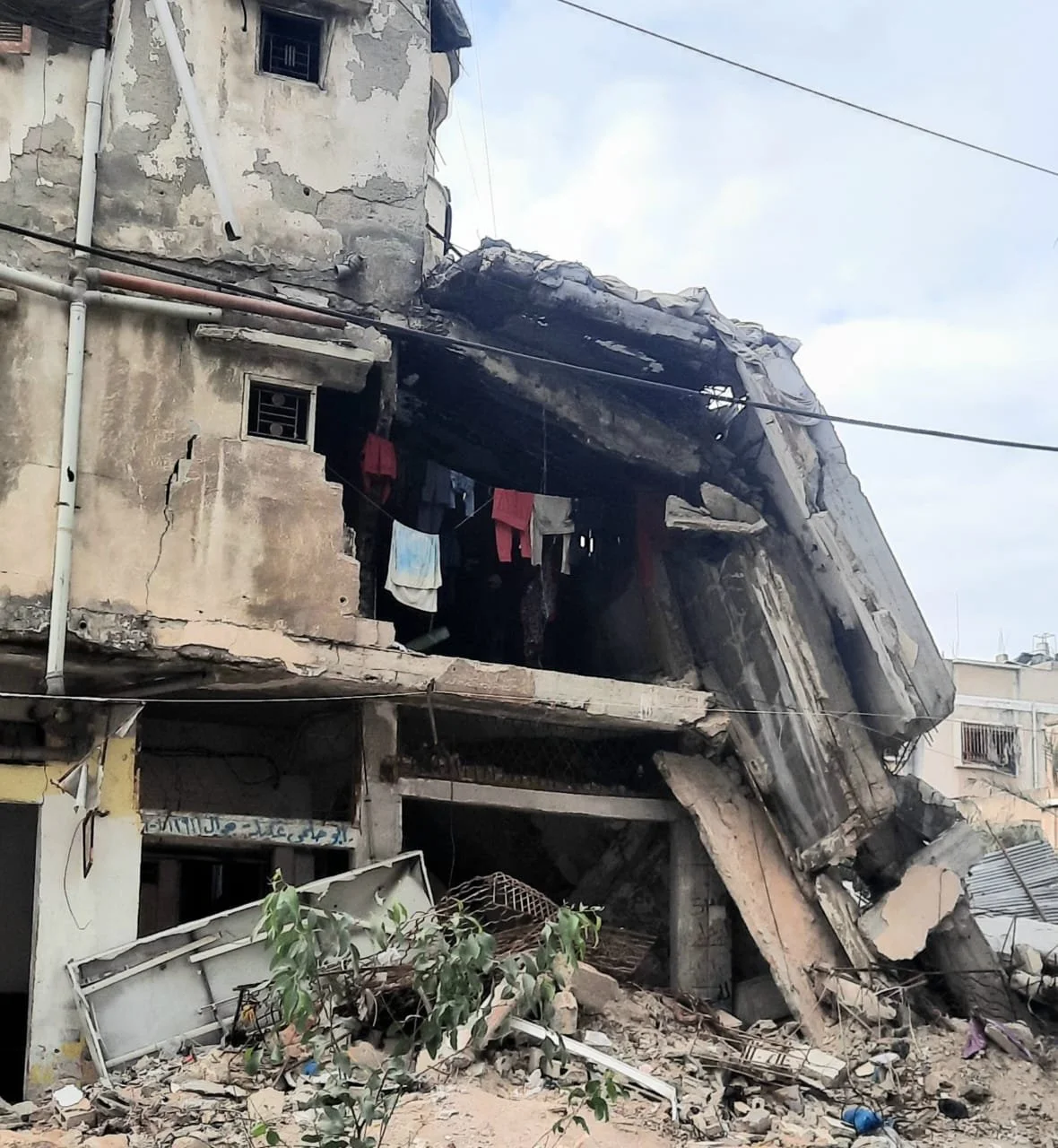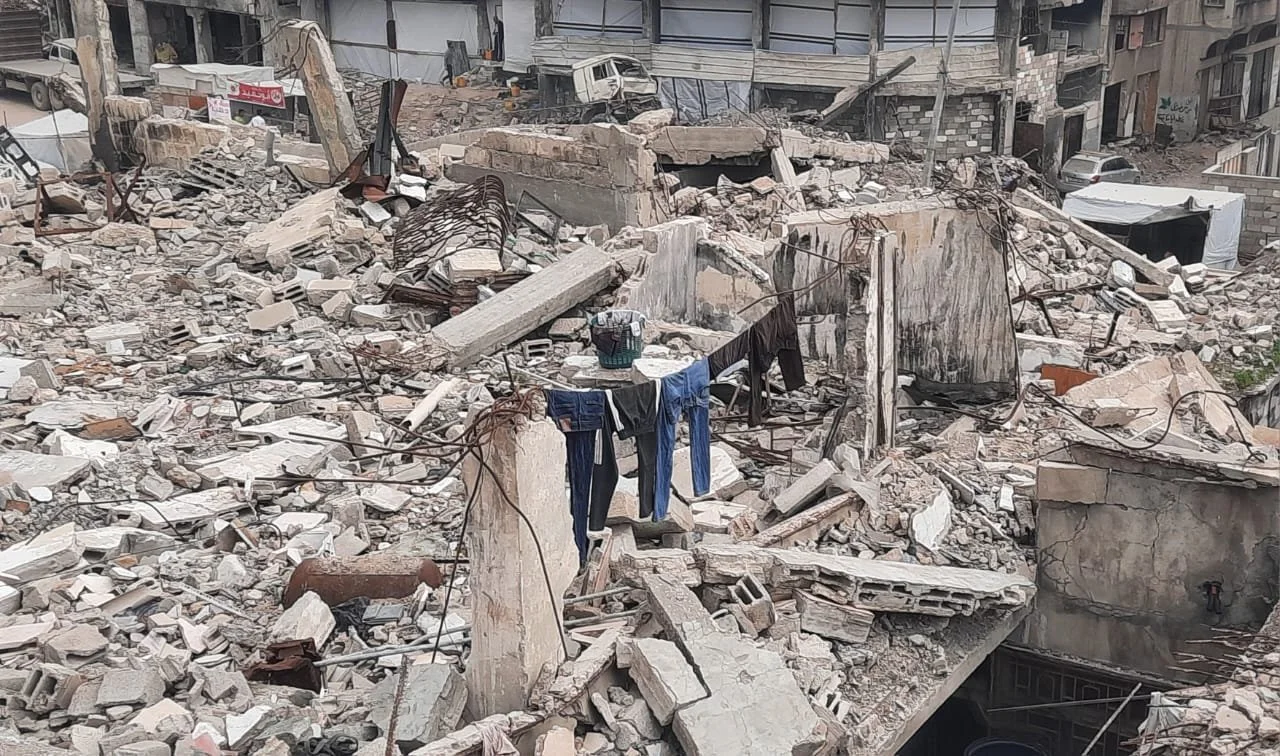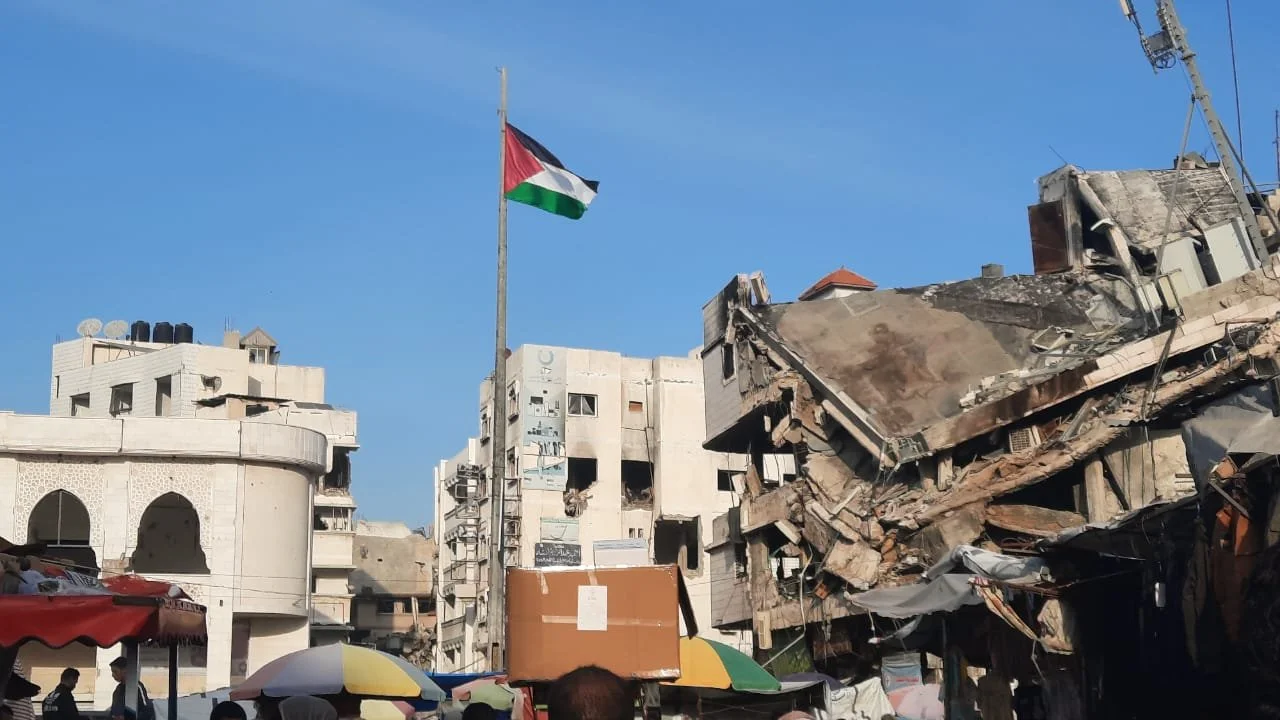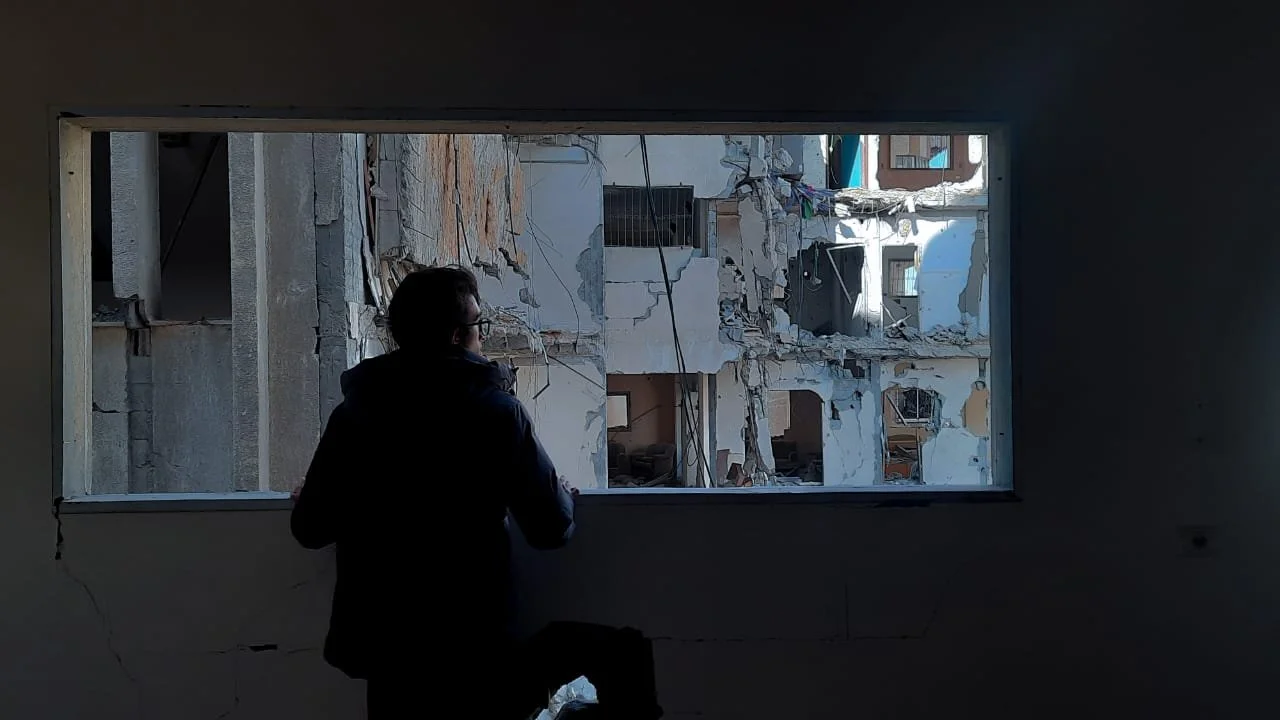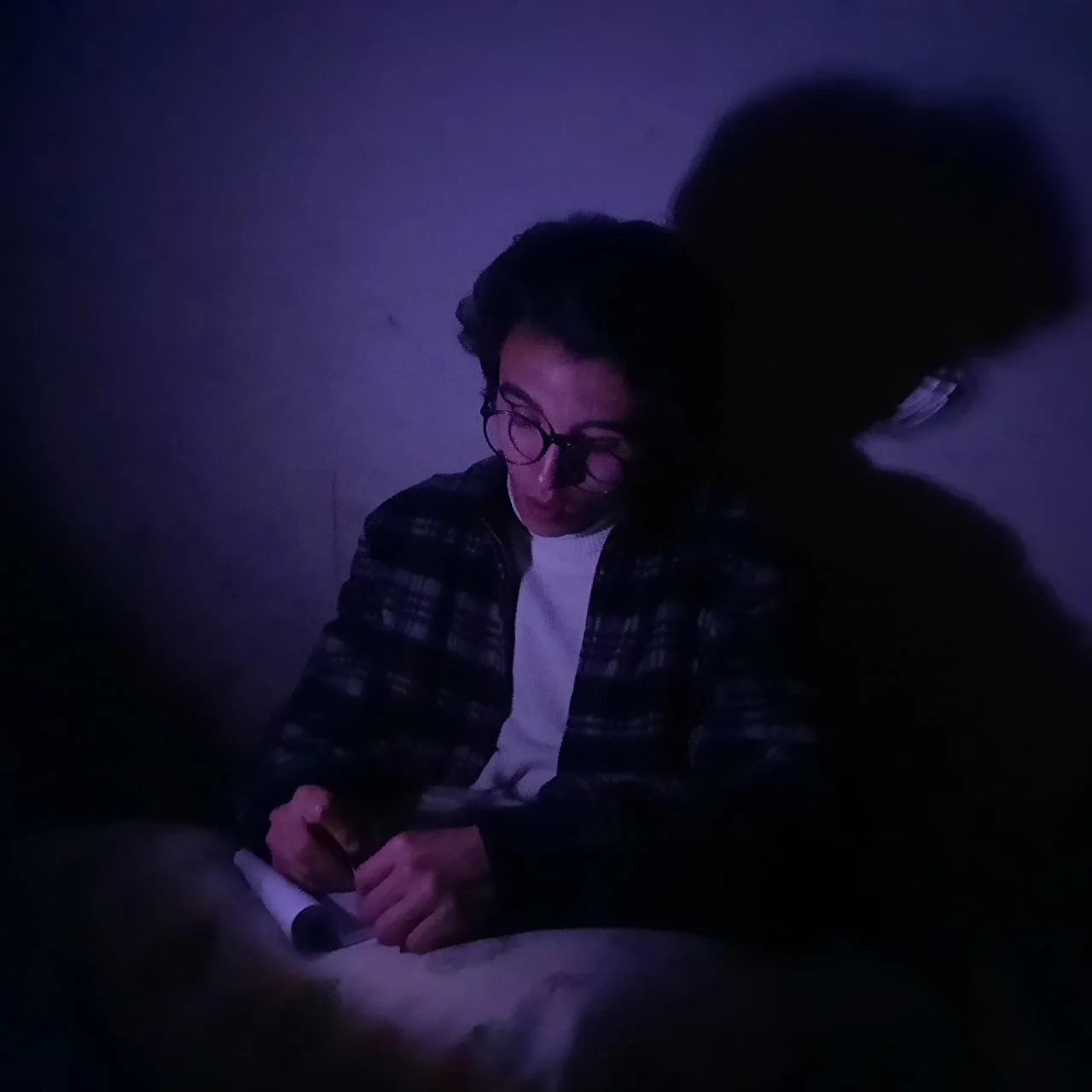رسالة من الإبادة
حيدر الغزالي
٧.٧.٢٠٢٥
Letter from the Genocide
by Haidar al-Ghazali
7.7.2025
scroll down for English on mobile
صديقتي التي خلف كل هذه البحار
كيف حال قلبكِ اليوم؟
لا أريد أن أزعجكِ برسالتي هذه، لكنني خبرت أن الكتابة بمقدورها أن تفجر هذا الثقل عن صدري، وأنّ من يقرأ وجعي يحمل شيئا بسيطاً منه، أعتذر أن الاختيار وقع عليكِ، لكن شيئاً يشعرني أنه بمقدوركِ فعل شيء لهذا العالم.
أريدُ أن أطمئن على قلبك، أعرف أنه يفكر بالطيور الجائعة، وبالأطفال الذين ينامون تحت زجاج المقاهي، وفي الشوارع الخلفية، ما حاله الآن وشعب كامل يُقتل؟
إنني أطلب أن تسألي نفسك دائماً عن حال قلبك، قد لا تخرجين بإجابات في مرات عديدة، لكنكِ تخرجين بمحاولة، وتجربة، وهذه الحياة يا صديقتي، محاولة وتجربة.
إنني أفهم الحياة كذلك، بشكل ربما لا يعرفه سواي، هنا حيث تتفتت لحظة العيش، وألق الحياة، ويصير للموت سطوته على الوقت، أحاول كثيراً ألا أخرج من البيت، الذي مصادفةً لم يدمر، أحاول أن أخلق فيه حياة عادية، أحاول أن أنسى، أن أغض النظر عن الوجع الذي يحدق، وأغلق أذنيّ عن الحزن الذي يصرخ. في طريقي إلى الحياة، وجدت أنني لم أعش، أنا الذي مصادفةً إلى هذه اللحظة، لم أمت.
لقد خابت كل محاولاتي، الحياة لا تريدني، جاءت بي إلى الحرب والمشقة، لم أخبركِ أن أول حرب عشتها كنت وقتها في الرابعة، كان بمقدور الحرب أن تقتلني وأُنسى، لكنها آثرت أن تتركني بلا هُوية، لستُ حياً، لستُ ميتاً، أنا ذلك الشيء غير الموجود بينهما.
لا تسألي عن قلبي، ولا تصدقيني إن قلت أنني بخير، إن الخير الوحيد هنا أنكِ تقرأين يا صديقتي، ويمكنكِ الخروج في مظاهرة ضد الحكومات، وتصرخين بحناجر الأطفال في الأكفان، وتعلمين أن ذلك ليس كافياً، لادخال شربة ماء واحدة في الحصار، لكنكِ تحاولين.
إن الخير الوحيد هو قلبكِ الذي ما زال يشعر بالجراح، وعيونكِ التي تغرق أمام كل صورة لطفلة مبتورة لم تجرب المشي، إن الخير يا صديقتي أنكِ تريدين اسقاط تلك الأنظمة الليبرالية التي تحكم العالم بالدكتاتورية التي تظهر كأنها ديمقراطية!
قلت لكِ أنني لا أخرج من البيت، لكنني ها أنا أكتب لكٍ بعد عودتي من المشفى، جاءنا خبر دفعنا للركض مباشرةً إلى هناك، قالوا أن عمي قد أصيب، وأغلقوا الهاتف.
عمي ليس عسكرياً، لا يعرف مؤسس الصهيونية، ولا يحفظ تواريخ القضية، يحب العالم بلا سبب، رغم أنه وصل الأربعين دون أن يسافر، يعامل الناس كأنهم ألواح زجاج، يشتري من الفقراء ملابسهم، ويبيعها لفقراء أخرين، في خيمة على باب المشفى، وهكذا يخرج بغلّةٍ لا تكفي غالباً لشراء كيلو طحين واحد لأبنائه.
إنني في هذه اللحظة يا صديقتي خبرت ما يعنيه الموت والخيبة والأمل والحنين والذكرى الظلم والحياة والقسوة، قصص كثيرة يا صديقتي واحتمالات أتت إليّ من كل خوف، وجزع، خصوصا أنني رأيت برك الدم النائمة في خيمة عمي التي يبيع فيها الملابس، هذا الدم أعرفه، له رائحة أعرفها، تشبه الحب الذي يوزعه عمي، إنني في هذه اللحظة يا صديقتي خبرت أنني لست عشرينياً كما يظهر، أتعبني هذا الركض وقذف في رأسي دوار شديد، وسكاكين في ركبتيّ، لستُ ذلك الذي ركض في الحارة مراراً ولعب الكرة وكسر زجاج المحلات، كبرت، كبرت كثيراً، كثيراً.
صاروخ من مسيرة إسرائيلية، سقط أمام باب المشفى، المجاور للسوق، وخلف ذلك ضحايا واصابات.
مشفى، سوق، وصاروخ، ثلاثية لن تكون إلا إن كانت الطائرة إسرائيلية.
وصلت المشفى، المستشفى الأهلي المعمداني، سألت عن غرفة الطوارئ، قالوا أنها هناك،
_ أين؟؟
_تلك الخيمة.
لا أخفيكِ يا صديقتي كم كنت محرجاً من كلمة غرفة، غرفة الطوارئ فعلا تحولت إلى خيمة، خيمة كبيرة ومهترئة، تشبه حزننا.
طاقة الخيمة أقل من حجم الحدث، والمكان مكتظ برائحة الموت والشخير والوداع. عمي، بحثت عن عمي في جميع الأسرّة، لم أجده، ووجدته أخيراً، على البلاط، عارياً نصف جسده العلوي، يحاول الأطباء والأقرباء أن يوقفوا نزيف قدمه، بخرقة كانت لتوها قميصاً.
عمي مستيقظ، وهذا يدعو للأمل، لكن جراحه نازفة وأشعر بألمها ينخز قلبي، يعصره كما تعصر أمي ملابسنا بحرص أن يخرج من يدها دون بلل.
تركت عمي مع أقربائي، وخرجت من الخيمة، لا أطيق رؤية هذا الموت دفعة واحدة، وأريد حين تحدثني عن اللون الأحمر، أن أتذكر الحب فقط، الحب فقط.
يا صديقتي، ليس بمقدوري أن أفارق المزيد، الطيور التي في صدري تمزقت أعشاشاها، وهي تبحث عن عيون أحبابي التي أقامت بها طوالاً.
من خلفي، كانت جدتي، زوجة عمي، وأبناؤه، لا يصدقونني حين أخبرهم أن عمي بخير، هم رأوا دماءه في الخارج.
أريد أن أخبركِ أن جدتي تركت على كتفي دموعها، كان ثقيلاً عليّ ذلك، وأحسب ذلك تكليفاً لأكتب لكِ يا صديقتي، ليس خياراً ألا أكتب، إن هذه الجراح التي في قلبي، والدموع التي في عيون جدتي، والدم الذي نزفه عمي لتوه، وكل القصص التي عشتها، ليست ملكي فحسب، إنه ملك أجيالنا التي ستأتي غداً وتعرف الحقيقة، وتوجه جام غضبها على المجرم الحقيقي، إنها ملك أجيالكم التي ستوحد العالم باسم الانسان، ضد الشياطين التي تنشئ الكراهية.
حاولت أن أطمئن جدتي، طلبت منها أن تعود إلى البيت، وافقت على مضض، نظراتها على خيمة الطوارئ، تحدق في قلبها الذي ينزف.
لزم عمي أن يجري صورة أشعة طبية، الشظايا دخلت قدميه، وأكتافه، شظايا غريبة بحجم حبة عدس تدخل من جهة وتخرج من الجهة المقابلة، لم نجد لنقله سوى سرير مهترئ أرضيته من أسلاك حديدية أشعر بها تنخز جسد عمي كلما مرت عجلات السرير على حجر في ساحة المشفى، أو حفرة تسببها قصف سابق.
في المشفى كله، جهاز واحد لتصوير الأشعة، وآخر مثله للتصوير الطبقيCT ، ممر مكتظ بالإصابات، أمامنا يموت أطفال، رجال، نساء، كان يمكن أن يعيشوا لولا انهيار المنظومة الطبية، لولا هذا الطابور الطويل، عمي بجراحه الدامية كان في آخر الدور، لأن اصابته العاجلة، أقل الإصابات خطورةً!
يا صديقتي، إن السرير الذي كان ينام عليه عمي، بدا لي أنه رفاهية، أرّقني ذلك طويلاً، وغرس في صدري الحسرة والخجل من التذمر الذي كنت عليه. مسنةٌ كانت على البلاط تنتظر دورها يا صديقتي، مليئة بالجراح، مسنة على البلاط البارد يا صديقتي، تحدق في السقف. إن جسدكِ هذا أيتها المسنة يلعن كل العالم ويجعل من حياتنا أكذوبة مريرة لها طعم الشقاء والمرار، أردد لنفسي.
لقد مللت من الطابور، ومشهد الدم، خرجت إلى بوابة المبنى، ورأيت الإسعافات التي لا تتوقف عن المجيء، محملةً بإصابات، وشهداء.
عائلة كاملة قضت في بيتها، شاب ذهب ليستلم نصيبه من (مؤسسة غزة الإنسانية) فقنصه جندي يفترش الأرض ويلاعب أجسادنا، كما يلاعب صياد فريسته.
وإصابات تأتي من مستشفى الشفاء، لماذا يجيئون بالإصابات من مستشفى الشفاء إلى هنا؟
_مستشفى المعمداني هو المستشفى الوحيد في شمال قطاع غزة الذي لا زال يحتوي على جهاز أِشعة!
صديقتي التي خلف كل هذه البحار
لا تسأليني عن حال قلبي
إنه أبيض جداً
ملطخ بكل الأشياء الداكنة التي تعرفينها
له رائحة الورد
ومذاق الحسرة والوحدة
قراءتكِ لهذه الرسالة هو الشيء الوحيد الذي يشعرني أنني لست وحيداً
صديقتي
كيف حال قلبكِ اليوم؟
How is Your Heart Today?
I don’t want to upset you with this note, but I’ve learned that writing can explode this weight off my chest, and that whoever reads my pain carries away a small part of it. I’m sorry the choice fell on you, but something tells me that you can act upon this world.
I’m asking after your heart. I know it feels for birds who go hungry and children who sleep in back streets or under the window-fronts of cafés. How is it doing now - when a whole people is being killed?
I ask that you always check on the state of your heart. A lot of the time you might not get an answer, but then you’ve tried, and gone through an experience. And this is life, my friend: an attempt, and an experience.
Haidar al-Ghazali
I understand life too, perhaps in a way that only I know, here where the moment of life and its brightness fragment, and death has dominion over time. I try not to leave the house which, by some chance, has not been destroyed. I try to create an ordinary life in it, I try to forget, to close my eyes to the hurt that stares, my ears to the sorrow that clamours. On my way to life I found I had not lived, I, who till this moment, have not died.
My attempts have all failed; life does not want me, it landed me in wars and hardship. I haven’t told you that the first war I lived was when I was four. It was in war’s power to kill me, and I would have been forgotten. But it preferred to leave me not alive, and not dead. I am that space between life and death.
Don’t ask after my heart. And don’t believe me when I say I’m good. The only good here is that you, my friend, are reading this, and that you can go out and protest against governments, you can scream with the voices of the children in their shrouds, and you know that even that is not enough to bring a single drop of water into the siege - but still you try.
The only good is your heart that still feels the wounds, your eyes that well up at every photo of a child amputated before she could walk. The good, my friend is that you want bring down these Liberal systems that rule the world with a dictatorship masquerading as democracy!
I said I don’t leave the house but here I am writing after I’ve come back from the hospital. We heard news that sent us running: they said my father’s brother was hit.
My uncle is not a military man, he doesn’t know who the founders of Zionism were, doesn’t memorise the dates of our dispossession. He loves the world without a reason even though he’s reached forty without ever traveling. He treats people as though they were made of glass. He buys clothes from the poor and sells them to other poor, from a tent at the gate of the hospital. What he makes often can’t buy one kilogram of flour to feed his kids.
In this moment my friend I felt the meaning of death and disappointment and hope and yearning and memory and injustice and life and cruelty. Many stories, my friend, many possibilities came to me from every fear, every terror, especially since I saw the pools of blood in the tent from which my uncle sold the clothes. I know this blood, it has a smell that I know, like the love my uncle distributes. At this moment, my friend, I realised that I am not in my twenties as it seems; running exhausted me, it threw a terrible dizziness into my head, and knives into my knees. I am no longer that boy who used to run in his street, who played football and broke the shop windows. I’ve grown, grown old, old. A missile (rocket? shell?) from an Israeli drone fell at the hospital gate, by the market, and it left dead and wounded.
A hospital, a market, a missile - a trinity that will only exist if the plane is Israeli.
I reached the hospital, the Ahli Mamdani [Local Baptist] Hospital. I asked for the Emergency Room, they said it’s “there”.
“Where?”
“That tent.”
I won’t say how embarrassed I was that I’d used the word “room”. The Emergency Room had become a tent, a tent large and ragged, like our grief.
The capacity of the tent was less than the size of the event and the place was bursting with the smell of death and the noise of laboured breath - and farewells. My uncle, I looked for my uncle in all the beds and I found him at last on the tiles of floor, his upper body bare, doctors and relatives trying to stop the haemorrhage in his leg with a rag that a moment ago was his shirt.
He’s awake, and that’ a source of hope, but his wounds are bleeding and I feel the pain of them in my heart, wringing it as our mother wrings our clothes so they leave her hands dry.
I left the tent. I cannot bear to see all this death all at once. I want, when we speak of the colour red, to think of love, only of love.
My friend, I cannot take any more partings. The birds in my heart have lost their nests, they search for the eyes of my loved ones who had lived there for so long.
Out there, my grandmother, my uncle’s wife, his children, wouldn’t believe that my uncle was alright. They’d seen his blood in the tent.
I want to tell you that my grandmother left her tears on my shoulder, heavy on my shoulder, they demanded that I write to you. I do not have the choice to not write. These wounds in my heart, these tears in my grandmother’s eyes, this blood my father’s brother shed, and all the stories I have lived - none of these are mine alone; they belong to our generations that will come tomorrow and will know the truth, the generations who will direct their anger at the real criminal. They belong to your generations who will unite the world in the name of all that is human, against the demons who sow hate.
I tried to comfort my grandmother. I asked her to go home. She agreed reluctantly, her eyes on the emergency tent, gazing at its haemorrhaging heart.
My uncle had to have an X-ray. Shrapnel had gone into his legs and his shoulders; strange shrapnel, the size of a lentil, it entered from one side of his body and exited from the other. We found no stretcher but an old bedstead with a bed of iron that spiked into his flesh as the wheels rumbled over the stones and ditches left in the hospital courtyard by past shellings.
In the whole hospital, just one X-ray machine, and one for the CT scans. Corridors full of wounded. In front of us die children, men, women who could have lived if the health system had not collapsed, if there wasn’t this long queue. My uncle, bleeding profusely, was at the end of the queue because his injuries were the least dangerous.
My friend, that iron bed he lay on was a luxury. An old woman was on the floor waiting her turn, full of wounds. Old on the cold floor, my friend, staring at the ceiling. This body of yours, Lady, I repeat to myself, this body of yours curses the entire world and makes a bitter lie of our lives.
I left the queue, the whole bloodied scene. I went to the gate and watched the endless emergencies arrive, the vehicles loaded with the wounded and the martyrs.
A whole family killed in their home. A young man killed when he went to collect food. They play with us, hunters with prey.
Injuries coming in from al-Shifaa Hospital. Why are they bringing people from al-Shifaa?
“The Mamdani is only hospital in North Gaza that still has an X-ray machine.”
My friend who lives beyond all these seas,
don’t ask after my heart
my heart is very white
stained with all the dark things you know
it smells of roses
and tastes of sorrow and loneliness.
You reading this letter is the only thing that makes me feel I am not alone.
My friend,
How is your heart today?

